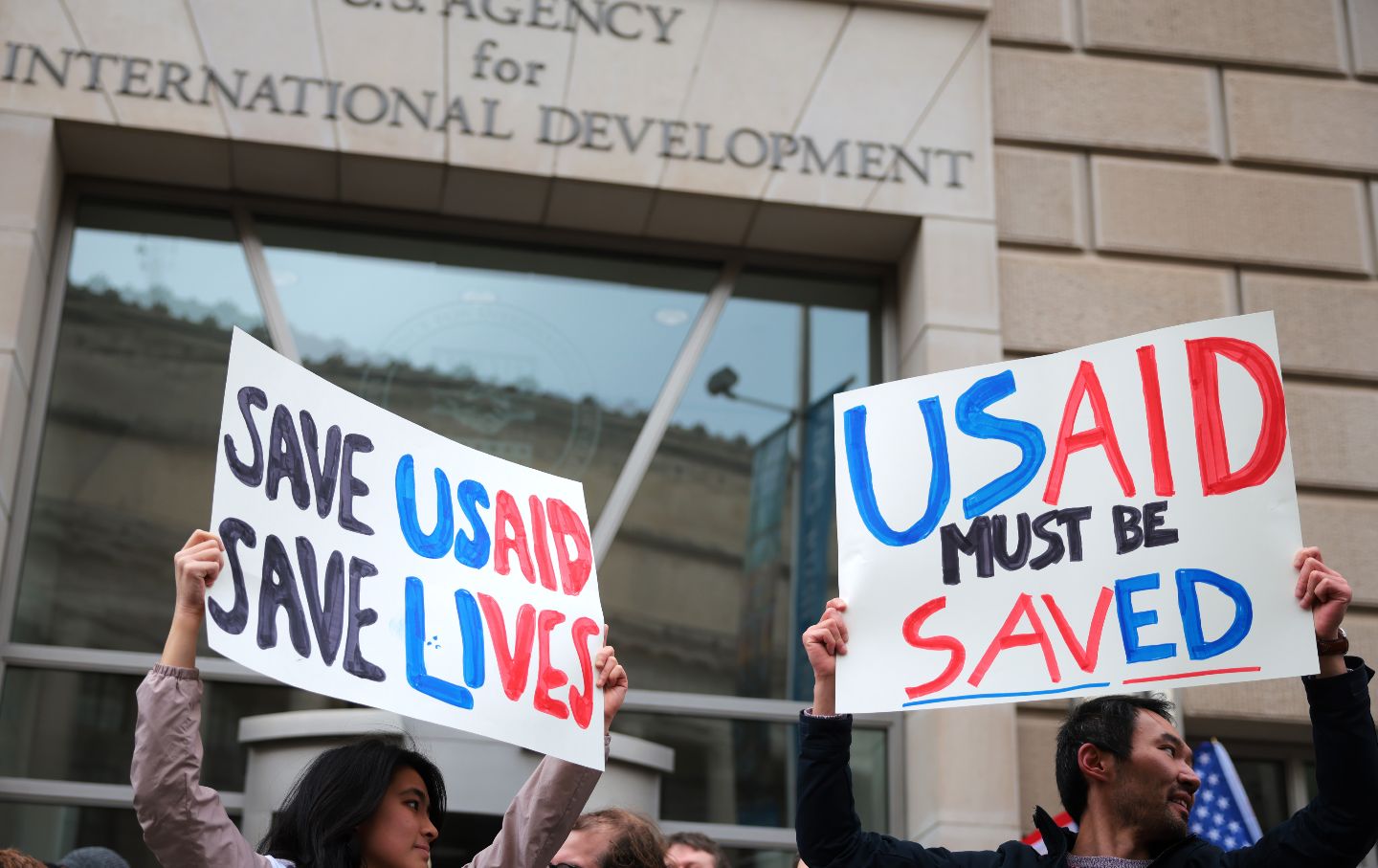Politics
/
StudentNation
/
July 9, 2025
Staff at Media Empowerment for a Democratic Sri Lanka never expected their small initiative to become the target of the kind of fake news it had actively worked to fight against.

Protestors gather outside of USAID headquarters in Washington, DC.
(Kayla Bartkowski / Getty Images)
On February 5, Elon Musk took to X to criticize the US Agency for International Development. The Trump administration had already paused funding to 90 percent of the agency’s projects around the world. But Musk continued to denigrate the agency as a “radical-left political psy op” to his 221 million followers for weeks after President Trump suspended the majority of its operations. On this particular day, he retweeted a list of “ridiculous projects” flagged by Rapid Response 47, a White House–affiliated account. “7.9 million [went] to teach Sri Lankan journalists how to avoid ‘binary-gendered language,’” the post claimed. Musk lambasted the initiatives as a “crazy waste of your tax money!” His followers responded with conspiracy theories and calls for USAID staff to receive jail time.
In Sri Lanka, staff at Media Empowerment for a Democratic Sri Lanka, the program allegedly funding pronoun training, were shocked by the attention. They had not spent any funds on the kind of work Musk described. The $7.9 million MEND had received went to countering disinformation in Sri Lanka by equipping students, teachers, civil servants, and journalists with educational resources. It hosted training sessions teaching individuals to spot misinformation, develop their reporting skills, and engage in mobile journalism.
None of MEND’s former employees had expected their small initiative to become the target of the kind of fake news it had actively worked to fight against. “This particular activity is a classic example of a disinformation campaign,” said Ishara, a previous employee, whose name has been changed due to the ongoing nature of the USAID funding pause
MEND is among more than 5,000 projects around the world that lost funding under the Trump administration’s shutdown of USAID. With the project closed, its former staff worry its end could produce more than hostile X comments. In Sri Lanka, where the social divisions that spurred the country’s 26-year civil war loom large online and in the press, the end of programs like MEND threatens to fuel violence offline.
Sri Lanka has become a hotbed for online hate speech and false information over the past decade. The country has more mobile devices than people and over a third of its citizens actively use social media. Its high connectivity has come at a cost. Disinformation is a common problem on increasingly popular social media sites, such as Facebook and X. During the country’s 2024 election, digital hate speech and disinformation surged around the island. False digital claims have catalyzed violent attacks on the island’s ethnic and religious minorities. In 2018, a Facebook post about the death of a Sinhalese Buddhist man during a traffic altercation with two Muslim individuals escalated rapidly into riots where crowds burned a man to death. Experts reflect that work by groups like MEND helped build digital literacy skills that could counter this division.
“This is a need in Sri Lanka,” said Sanjana Hattotuwa, the former director of the New Zealand–based Disinformation Project and a researcher who studies Sri Lanka’s digital landscape. “[Disinformation] has a material impact on lives and livelihoods, on the economic conditions, and policies that the government takes…that has a direct impact on Muslims and other minorities in this country.”
Current Issue

No group has emerged in MEND’s absence, and the lack of an alternative has led to concerns that digital violence will worsen in the coming years. “If you don’t have a population that is inoculated against the manner in which social media can manipulate their emotions, their reactions, their behaviors, you’re going to have a problem,” said Hattotuwa. “It’s a very, very clear progression towards an unstable and violent society.”
Months later, employees still wonder why they were targeted, and fear that the social media firestorm Musk’s attention set off only emphasizes the need for the work they are now unable to do. “[The trainings] gave an awareness about the media, how the media works, media ethics, how a person as a consumer should be aware [to] avoid misinformation…[and] how people become vulnerable to using hate speech, and how it affects people,” said Shaifur Rahman Sadhaka, a former trainer with MEND. “People should have a critical eye with them that protects them.”
The project worked closely with a variety of media organizations. It received praise from the US ambassador Julie Chung for its contributions to promoting independent, accurate journalism. With its support, local media outlets expanded their capacity. Its resources were particularly meaningful to advancing gender equality in the field. “In a country like Sri Lanka—where we lack comprehensive relationship education and do not have effective, sustainable systems for addressing topics such as gender, gender-based violence, or sexual health in schools—this responsibility often falls on the media,” said Ishara. Only 15 percent of government-registered Sri Lankan journalists are women, and the project’s employees saw discussing gender inequality as a necessary element of strengthening local reporting. At training sessions, employees found that many younger attendees also wanted information on how to report about gender identity. Some had heard about Sri Lanka’s LGBTQ+ community but felt they lacked the knowledge to cover it effectively. MEND provided basic technical information that could make this reporting possible. “That’s why the work we did through the MEND program, especially from a gender perspective, was so important,” said Ishara.
In conversations with former employees, some had never heard of the “binary-gendered language” projects Musk referenced. Others could think of only one potential instance.
“There was a single social media post that was published on our Facebook page which focused on the importance of being mindful of pronouns when conducting interviews,” said Ishara. The Facebook post included definitions of terms like “gender” and recommendations to check others’ pronouns. Employees recalled that many of the recommendations stemmed from common concerns. “In response, we addressed these issues directly in the trainings,” Ishara told The Nation. “Since participants found this information helpful, we decided to share a post online.”
The post caught the attention of American far-right media years before it reemerged on Musk’s account. The initial claim about “binary-gendered language” training stemmed from a 2022 Fox News article that alleged MEND ran an “extensive campaign” dedicated to the issue. “That information is absolutely wrong,” said Tharushi, another employee who also requested anonymity due to privacy concerns. “That sum of millions of dollars was the entirety of the project. And the gender project was probably $15,000 in the entire two-year period. And that wasn’t just talking about pronouns…pronouns and all was done in-house.”
Popular
“swipe left below to view more authors”Swipe →
At the time of the Fox article, MEND’s leaders did not worry about the program facing repercussions from the bad press. “There wasn’t any threat as such back then,” Tharushi told The Nation. “We didn’t see the outcome of that article until Trump was elected the second time.”
To MEND’s staff, the article and the social media discourse it spurred are proof of their effort’s importance. They are also a reminder of a gap they cannot fill. In Colombo, MEND’s former office is shuttered. Many of its staff have tried to move on, finding temporary employment or academic opportunities they hope will let them wait out the USAID cuts until the next administration. As disinformation continues, however, former employees refuse to give up on the project’s goals permanently. “Our work, and our fight for these rights, will continue—with or without financial support from USAID,” Ishara said. “The loss of funding may slow us down, but it will not stop us.”
More from The Nation

The independent populist from Nebraska, who came close to winning in 2024, is running to unseat one of the Senate’s wealthiest and most self-serving members in 2026.
John Nichols

The key players in the corruption and destruction of the Supreme Court portrayed as
vermin.
OppArt
/
Steve Brodner

Paramount’s settlement with Trump is a symptom of deep structural rot in our corporate media system.
Victor Pickard

The tech mogul’s latest intervention in US politics serves as a perfect proof of concept for the futility and stupidity of billionaire-driven politics.
Chris Lehmann


